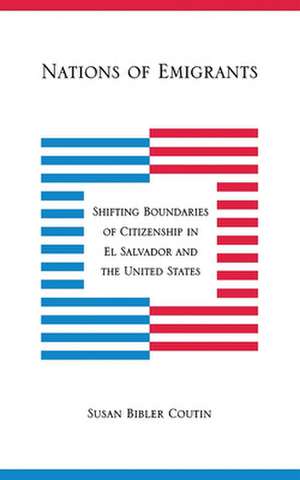Nations of Emigrants – Shifting Boundaries of Citizenship in El Salvador and the United States
Autor Susan Bibler Coutinen Limba Engleză Hardback – 9 sep 2007
During the 1980s, U.S. officials generally regarded these migrants as economic immigrants who deserved to be deported, rather than as political refugees who merited asylum. By the 1990s, these Salvadorans were made eligible for legal permanent residency, at least in part due to the lives that they had created in the United States. Remarkably, this redefinition occurred during a period when more restrictive immigration policies were being adopted by the U.S. government. At the same time, Salvadorans in the United States, who send relatives more than $3 billion in remittances annually, have become a focus of policymaking in El Salvador and are considered key to its future."
| Toate formatele și edițiile | Preț | Express |
|---|---|---|
| Paperback (1) | 244.17 lei 43-57 zile | |
| MB – Cornell University Press – 9 sep 2007 | 244.17 lei 43-57 zile | |
| Hardback (1) | 722.09 lei 43-57 zile | |
| MB – Cornell University Press – 9 sep 2007 | 722.09 lei 43-57 zile |
Preț: 722.09 lei
Preț vechi: 989.15 lei
-27% Nou
Puncte Express: 1083
Preț estimativ în valută:
138.18€ • 143.45$ • 115.23£
138.18€ • 143.45$ • 115.23£
Carte tipărită la comandă
Livrare economică 24 martie-07 aprilie
Preluare comenzi: 021 569.72.76
Specificații
ISBN-13: 9780801445743
ISBN-10: 0801445744
Pagini: 288
Dimensiuni: 152 x 229 x 25 mm
Greutate: 0.58 kg
Ediția:New.
Editura: MB – Cornell University Press
ISBN-10: 0801445744
Pagini: 288
Dimensiuni: 152 x 229 x 25 mm
Greutate: 0.58 kg
Ediția:New.
Editura: MB – Cornell University Press
Descriere
Descriere de la o altă ediție sau format:
Coutin analyzes the case of emigration from El Salvador to the United States to consider how current forms of migration challenge conventional understandings of borders, citizenship, and migration itself.
Coutin analyzes the case of emigration from El Salvador to the United States to consider how current forms of migration challenge conventional understandings of borders, citizenship, and migration itself.
